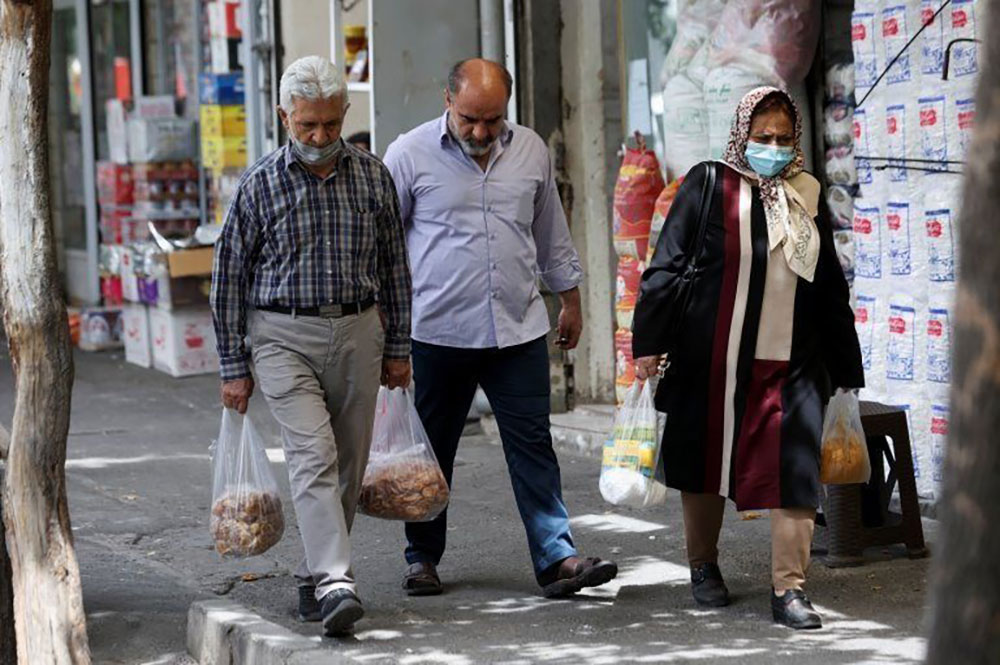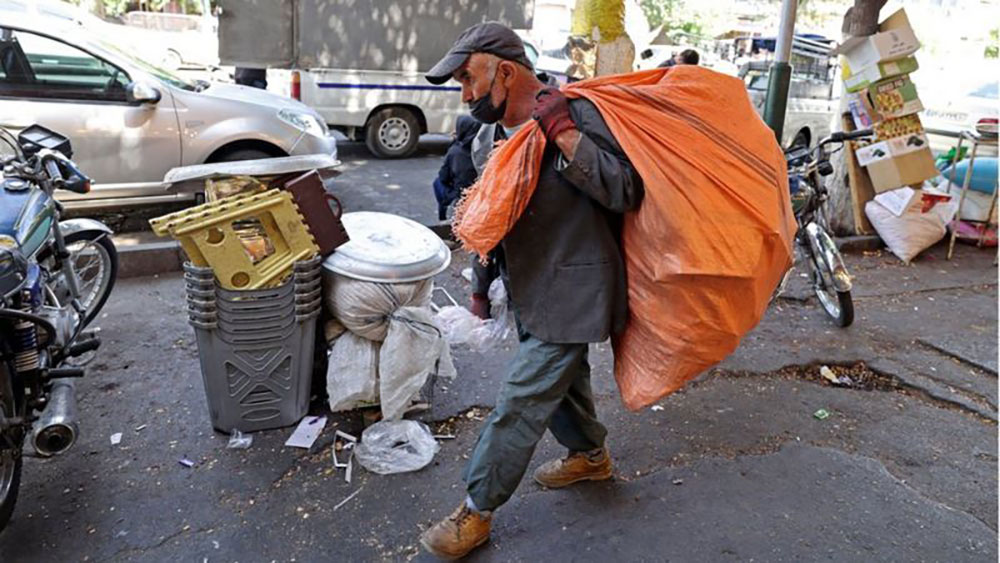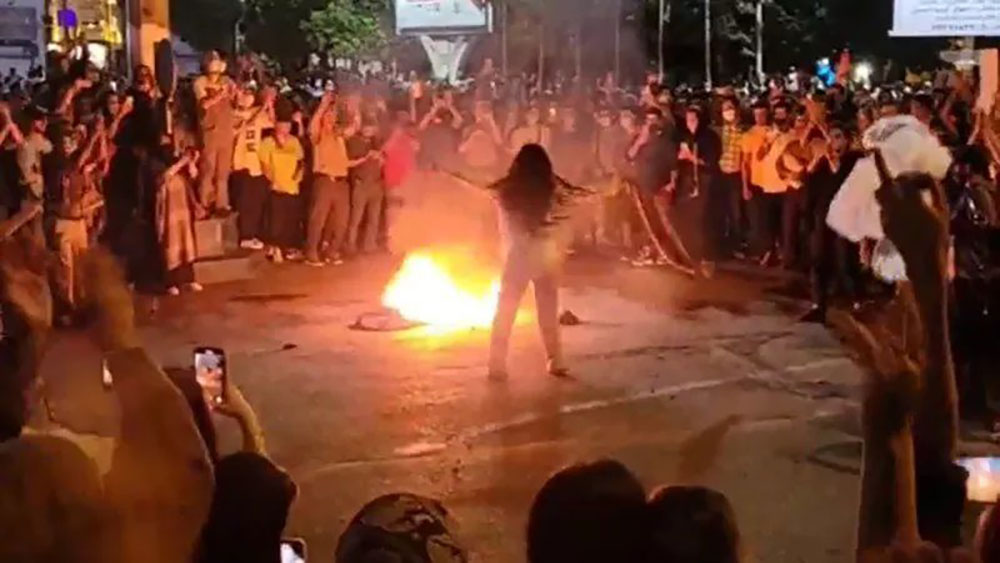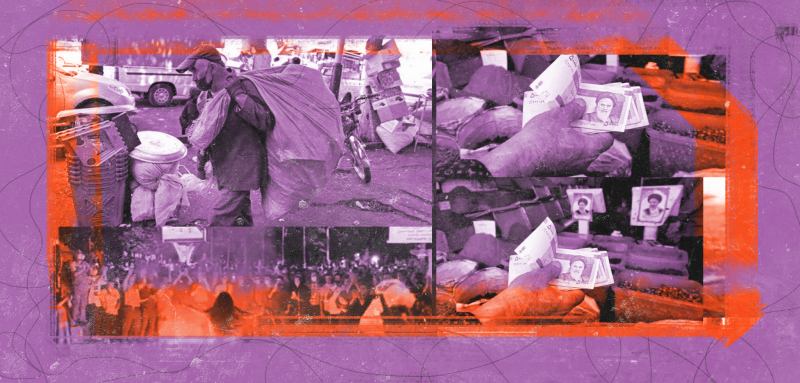“Ready to barter books for rice”, “Sneakers in exchange for meat”, “My shirt for some chicken”.. These are some of the phrases that have been recently circulating on some platforms in Iran. A few weeks ago, BBC Persian published on its Telegram account photos showing advertisements asking to barter or exchange food with household furniture or personal items. They were published on the Iranian website and mobile application "Divar" for advertisements and the sale of goods by citizens.
One of the photos circulating on social media shows a request to exchange used shoes costing 100,000 Iranian tomans (less than three US dollars) for rice or oil in the central Iranian city of Isfahan.
Another citizen from the northwestern Iranian city of Urmia posted an advertisement asking to exchange five of his shirts for some rice or oil at a price of 260,000 tomans (about seven US dollars). In the capital, Tehran, a citizen posted his own ad on the app showing textbooks that belonged to his children, requesting that they be exchanged for chicken or any other foodstuff.

In a comprehensive report on this new phenomenon that talks about the worsening of the living crisis in the country, the Iranian Shargh newspaper quoted, “The man in question was contacted and he told us that the books are secondary school books, and can be delivered in exchange for a quantity of food based on the price that the customer usually sets.”
Another man wanted to trade his shoes for legumes, while another in the northeastern city of Mashhad offered an old vacuum cleaner and requested food in its stead. Thus, the press report details this phenomenon of bargaining household furniture and personal belongings to survive.
A citizen from the northwestern Iranian city of Urmia posted an advertisement asking to exchange five of his shirts for some rice or oil at a price equivalent to about seven US dollars
"The amount of advertisements asking for trade-offs was very low a few months ago, but it has increased in recent weeks. It started from bargaining household appliances such as used irons, sofas, an old computer, and eyeglasses, with foodstuffs, but now the situation has reached the point of people bartering their clothes and shoes," Shargh newspaper reported.
Poverty production
Commenting on this, journalist Mohamed Mali says, “I can say that for many. The matter has gone beyond selling household furniture to fill their stomachs," hinting at the scale of inflation and rampant poverty in the country.
For his part, expert on poverty Jafar Khair Khahan wrote, "This phenomenon has occurred in the past in Venezuela and Greece for a limited time during the economic crisis. These advertisements are not surprising; they reflect the reality of the severe inflation statistics that are not reported by the country's official media.”

The expert stressed that the barter phenomenon is an extension of one that used to take place in the past; the sale of human organs due to poverty. He explained that instead of fighting poverty, the government has been producing poverty for decades through its economic policies.
"At present, the per capita income in Iran, which is full of natural resources and economic opportunities, has reached the income of the regular citizen of Bangladesh, a country that is poor in terms of resources and land, and constantly suffers from disasters such as floods," Khair Khahan described the state of the country.
For its part, the Statistical Centre of Iran (SCI) announced that the annual inflation rate for foodstuffs was 61.3 percent, while the monthly price inflation in November was about 68 percent.
Meat, dairy, and rice per person
For his part, Afshin Sadr Dadras, head of the Livestock Breeders Union of Iran, revealed that per capita consumption of red meat has dropped from 12 kilograms per year to 6 kilograms during the past year.
As for the Iranian Ministry of Health, it warned of the reasons for the decline in per capita consumption of dairy, which reached about 60 kilograms annually, from 100 kilograms previously.
Not far from that, the managing director of the Cold Water Fish Farmers Association, Arash Nabizadeh, stated that the share of Iranian citizens in fish consumption was reduced by 60% last year, currently reaching 7 kilograms annually.
As for the rice that Iranian citizens are looking for these days and is widely grown and cultivated in the country, its domestic consumption has seen a whopping 50% drop, due to its high price, according to Hassan Taqizadeh, head of the Rice Union in the city of Babel.
"The per capita income in Sistan and Baluchestan Province is equal to one-fifth of the per capita income in Tehran. The income of individuals in the provinces of Kermanshah and Kurdistan is one-third of the income in the capital,” economic experts in Iran warn
It is not yet clear whether these figures and numbers have increased or decreased according to official statistics in the current Iranian year, which is witnessing its tenth month. But the spread of the phenomenon of bartering through the “Divar” application among the community, as well as shedding light on the phenomenon by Iranian media, indicate a crisis that is worsening in light of the country's internal and external policies that are not in the interest of citizens.
Poverty and protests
Regarding the protests that have been taking place in the country for the past 3 months, which were described as calling for individual freedoms and respect for citizenship rights, especially for women and youth, poverty and deprivation were a main pillar in fueling the situation and the resentment of the demonstrators. Economist Hojjat Mirzaei says, "The per capita income in Sistan and Baluchestan province (eastern Iran) is equal to one-fifth of the per capita income in Tehran. The income of individuals in the provinces of Kermanshah and Kurdistan (western Iran) is one-third of the income in the capital.”
Economic journalist Maryam Shokrani further commented on this by saying, "I think that the reality of what is happening these days is evident through these statistics," referring to the protests that these provinces are witnessing with greater intensity than the rest of the provinces, especially in Kurdistan, which is the epicenter of recent events. The protests erupted there following the death of a Kurdish young woman named Mahsa Amini, whose hometown is in that province.

Government officials have repeatedly asserted that 60 million out of the roughly 80 million people living in the country are eligible to receive the government's financial livelihood support of 300,000 tomans ($8) per person each month.
While supporting government institutions sponsor 12 million Iranians from the poorest segment of society, and another million people stand behind their doors waiting to be accepted to benefit from this meager government support, the Shargh newspaper confirms — according to information obtained from the Iranian Welfare Database (IWD) — that 76 percent of that segment is no longer under the care of private government institutions, such as the al-Imdad charity association and the Social Welfare Institution.
The rise in the price of the dollar and the fall of the Iranian currency did not occur on a monthly or weekly basis, but rather daily, with the central bank fighting inflation and the economic crisis through financial liquidity, as the country witnessed the largest liquidity growth of its kind through money printing last year, according to a BBC Persian report on high prices and inflation in Iran.
Raseef22 is a not for profit entity. Our focus is on quality journalism. Every contribution to the NasRaseef membership goes directly towards journalism production. We stand independent, not accepting corporate sponsorships, sponsored content or political funding.
Support our mission to keep Raseef22 available to all readers by clicking here!
Interested in writing with us? Check our pitch process here!



